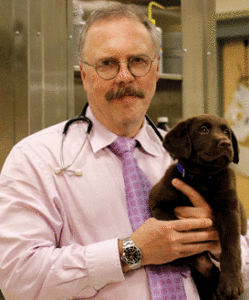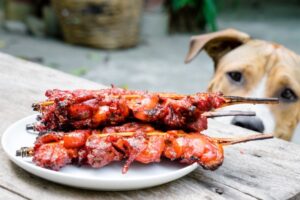-
Adopt
-
Veterinary Care
Services
Client Information
- What to Expect – Angell Boston
- Client Rights and Responsibilities
- Payments / Financial Assistance
- Pharmacy
- Client Policies
- Our Doctors
- Grief Support / Counseling
- Directions and Parking
- Helpful “How-to” Pet Care
Online Payments
Referrals
- Referral Forms/Contact
- Direct Connect
- Referring Veterinarian Portal
- Clinical Articles
- Partners in Care Newsletter
CE, Internships & Alumni Info
CE Seminar Schedule
Emergency: Boston
Emergency: Waltham
Poison Control Hotline
-
Programs & Resources
- Careers
-
Donate Now
 By Michael M. Pavletic DVM, DACVS
By Michael M. Pavletic DVM, DACVS
Director of Surgery, Angell
www.angell.org/surgery
surgery@angell.org
617-541-5048
As pet owners fire up the outdoor grill for the family barbeque, many are unaware of the underlying dangers to their pets. Simple, discarded food items can cause serious gastrointestinal problems in pets, and in some cases, death. Inedible objects attached to flavorful foods (skewers, string, foil, etc.) can also become tempting morsels for consumption.
Watch out for these common items:
- Corn cobs and peach pits
- Chicken, beef and pork bones
- Foil, plastic wrap and cotton string used to bind roasts
- Grease and meat drippings spilled onto loose wood/gravel
- Wooden/bamboo skewers for shish kabob or teriyaki
 Corn cobs and peach pits top the list of intestinal foreign bodies during the summer. Corn cobs flavored with butter or meat juices are especially tempting (and dangerous) to the family dog. Once in the stomach, the cob segments are not properly digested and eventually pass into the small intestine. The intestine cannot stretch enough to allow the corn cob to pass naturally, resulting in a small bowel obstruction. Both dogs and cats are at risk for swallowing the casually discarded peach pit, resulting in the same life-threatening condition. Chicken, beef, and pork bones are also readily ingested by wandering pets. Although less common, bone fragments can become lodged in the esophagus or intestinal tract. Esophageal obstruction with subsequent ulceration can result in a life-threatening infection.
Corn cobs and peach pits top the list of intestinal foreign bodies during the summer. Corn cobs flavored with butter or meat juices are especially tempting (and dangerous) to the family dog. Once in the stomach, the cob segments are not properly digested and eventually pass into the small intestine. The intestine cannot stretch enough to allow the corn cob to pass naturally, resulting in a small bowel obstruction. Both dogs and cats are at risk for swallowing the casually discarded peach pit, resulting in the same life-threatening condition. Chicken, beef, and pork bones are also readily ingested by wandering pets. Although less common, bone fragments can become lodged in the esophagus or intestinal tract. Esophageal obstruction with subsequent ulceration can result in a life-threatening infection.
Foil, plastic wrap, and the cotton string used to bind a roast can also become hazardous objects of consumption. Grease and meat drippings that spill onto the ground may flavor wood or gravel. Dogs may lick and swallow these foreign objects, occasionally in large numbers. (In one case I removed a small bucket of gravel from the stomach of a German shepherd!)
Perhaps the most insidious foreign bodies related to food consumption are the wooden or bamboo skewers used for shish kabobs or teriyaki dishes. Dogs, in particular, tend to chew on and swallow these pointed skewers. Unfortunately, the skewers often punch a hole through the wall of the esophagus, stomach or small intestine and then migrate throughout the body of the unfortunate pet. I have removed whole and partial skewers from a variety of locations in the thorax and abdomen of dogs. Fortunately, many pets survive after these miniature migrating “arrows” are removed.
Obstruction of the esophagus, stomach, or small intestine is often followed by vomiting or gagging, depending on the location of the obstruction. Continuous vomiting can lead to dehydration and depletion of the pet’s electrolytes, as well as other serious metabolic derangements. With perforation of the gastrointestinal tract, fatal infections can occur without prompt diagnosis, medical support, and surgical intervention. Veterinary costs increase with the severity of the patient’s condition.
Prevention is simple:
- Dispose of all these items in a secure garbage can with a lid
- Keep the garbage bag in the can until disposal
- If food products contact the ground, a few blasts from a garden hose can disperse the flavored residue
In so doing, your pet can enjoy the festivities and avoid a trip to the veterinarian. Happy grilling!
For more information about Dr. Pavletic or Angell’s Surgery service, please visit www.angell.org/surgery.